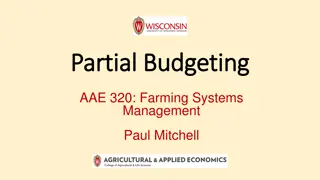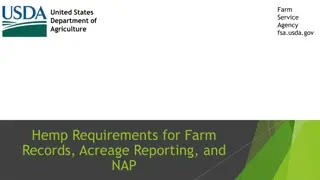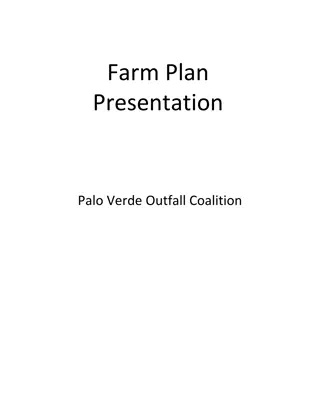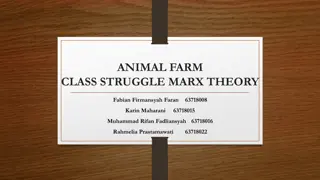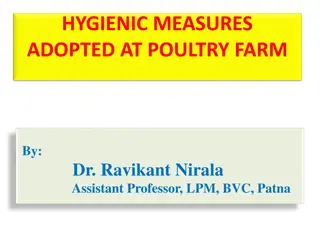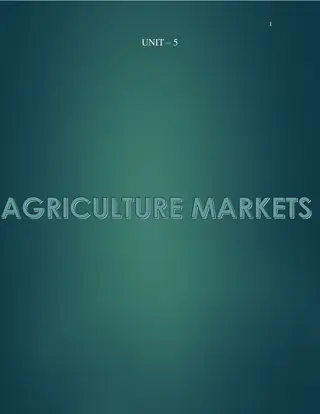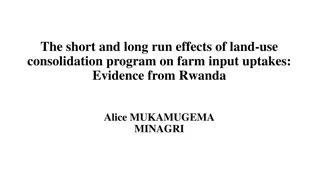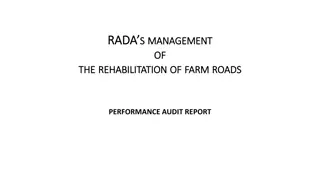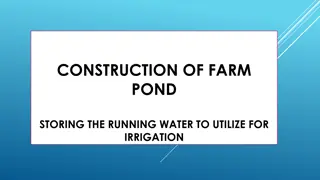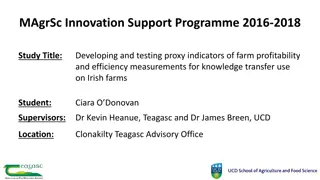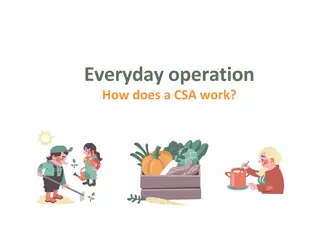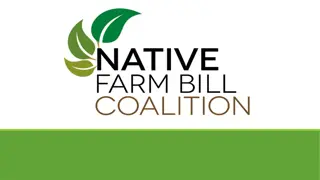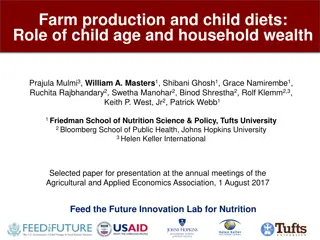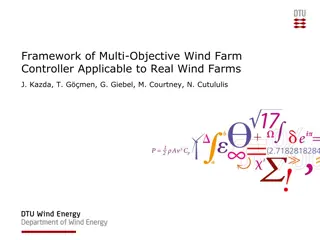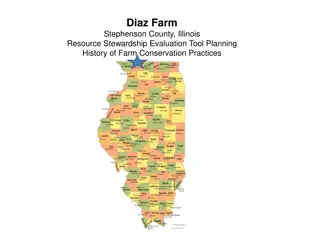Understanding Farm Management: Key Concepts and Importance
Farm management is the strategic organization of resources and decision-making processes on a farm to ensure efficiency and profitability. This involves managing factors of production, making crucial decisions, and aiming for the prosperity of farmers and the economy as a whole. The discipline of farm management is rooted in agricultural economics and plays a vital role in sustaining agricultural industries worldwide.
Uploaded on Jul 22, 2024 | 0 Views
Download Presentation

Please find below an Image/Link to download the presentation.
The content on the website is provided AS IS for your information and personal use only. It may not be sold, licensed, or shared on other websites without obtaining consent from the author. Download presentation by click this link. If you encounter any issues during the download, it is possible that the publisher has removed the file from their server.
E N D
Presentation Transcript
Chapter One Introduction to Farm Management 1
Chapter outline 1.1. Definition of Farm management 1.2. The importance of Farm management 1.3. Scope of Farm Management and its relation with other field of study 1.4. Basic Farm Management decisions 1.5. Attributes and Functions of Farm Manager 1.6. Farm Management Decision Making Problem in Ethiopian Case 2
Definitions of Farm Management Farm Management comprises of two words i.e. Farm and Management. Farm means a piece of land where crop and livestock enterprises are taken up under a common management and has specific boundaries. Farm is a socio economic unit which not only provides income to a farmer but also a source of happiness to him and his family. It is also a decision making unit where the farmer has many alternatives for his resources in the production of crops and livestock enterprises and their disposal. 3
Cont Management is the art of getting work done out of others working in a group. Management is the process of designing and maintaining an environment in which individuals working together in groups accomplish selected goals/objectives. Management is the key ingredient. The manager makes or breaks a business. 4
Cont The prosperity of any country depends upon the prosperity of farmers, which in turn depends upon the rational allocation of resources among various uses and adoption improved technology. Human race depends more on farm products for their existence than anything else since food, clothing the prime necessaries are products of farming industry. 5
Cont Even for industrial prosperity, farming industry forms the basic infrastructure (benchmark). Thus, the study farm management has got prime importance in any economy particularly on agrarian economy. 6
Farm management Farm Management a branch of Agricultural Economics deals with the economics of individual farm units. Farm management is concerned with the organization of factors of production for the production of farm products. FM is the art of applying economic principles in the management of a farm business 7
Cont 1. The art of managing a Farm successfully, as measured by the test of profitableness is called farm management. (L.C. Gray) 2. Farm management may be defined as the science that deals with the organization and operation of the farm in the context of efficiency and continuous profits. (Efferson) 3. Farm management is defined as the study of business phase of farming. 4. Farm management is a branch of agricultural economics which deals with wealth earning and wealth spending activities of a farmer, in relation to the organization and operation of the individual farm unit for securing the maximum possible net income. (Bradford and Johnson) 8
Cont Economics is the study of the principles that determine the allocation of scarce resources among competing ends, for the maximization of those chosen ends over time. Agricultural Economics is the application of economic techniques agricultural industries problems). and (solve principles agricultural to 9
1.2. Importance of Farm Management Agriculture is the science of converting productive resources to produce livestock, crops and fisheries. The farmer strives to combine the resources in such a way that he/she minimizes their use hence his cost while maximizing his output and hence his return, thereby ensuring that his income i.e. net returns or profit is as high as possible. 10
Cont The millions of small farm operators have unique objectives (other than profit maximization). These could be maximization of objectives like food security, stability of cash income and use of most limiting resource. Especially, the provision of sufficient staple food for family members is very important in a subsistence agriculture (farm family decision-making process). This is why in Farm Management attention is focused on the decision-making processes of individual farm units. 11
Farm management is very important not only in developed and commercial agriculture all round the world but also in developing and subsistence type of agriculture. And also/ A farm manager must not only understand different methods of agricultural production, but also he/she must be concerned with their costs and returns. FM/F must know how to allocate scarce productive resources on the farm business to meet his goals and at the same time react to economic forces that arise from both within and outside the farm. 12
Need for managing an individual farm arises due to: i. Farmers have the twin objectives, viz. maximization of farm profit and improvement of standard of living of their families. ii. The means available to achieve the objectives, i.e., the factors of production, are scarce in supply. iii. The farm profit is influenced technological, social, economic, political and institutional factors. by; biological, iv. The factors of production can be put to alternative uses. 13
I. On one hand, a farmer has a set of farm resources such as land, labor, farm buildings, working capital, farm equipment, etc. that are relatively scarce. I. On the other hand, the farmer has a set of goals or objectives to achieve (maximum family satisfaction through increasing net farm income and employment generation). This gap is bridged by taking a series of rational decisions in respect of farm resourceshaving alternative uses and opportunities. Thus, Farm management is concerned with resource allocation. 14
The study of farm management would be useful to transmit knowledge and skill for optimizing the resource use and maximizing the profit. That mean, FM provides the basic decision making tools which enable the millions of small farmsin making decisions daily regarding their farm operations. The quality of these decisions determine to a large extent the outcome and productivity of the agricultural economy. 15
Thus, an efficient Farm Management Decisions can lead to; 1) Increased agricultural output and 2) In turn, enable the sector to make its rightful contribution to the economic development of the country; i. Supplying Food to all sectors of the economy, ii. Supplying labor, iii. Source of savings, iv. Means of livelihood/ income, v. Source of employment generation vi. Source of Foreign exchange earnings and vii. Supplies raw material meeting the demand for industrial products 16
Thus, the study of farm management is crucial and central to the whole discipline of agricultural economics. The extension agent working with the farmers at the grass root level must be conversant with the principles and applications of farm management. The agricultural data recorder must appreciate why he/she is being requested to collect certain information from the farmer. This appreciation comes from the knowledge of farm management. The research scientist that goes out to collect data needs to apply the tools of farm management in analyzing the data. Therefore, the study of farm management enables the students to appreciate its usefulness to overall economic development of a nation. 17
Nature of Farm Management Farm management deals with the business principles of farmingfrom an individual farm perspective . Its is limited to the individual farm as a unit and it is interested in maximum possible returns to the individual farmer. It applies the local knowledge as well as scientific finding to the individual farm business. Also called as a science of choice or decision making. 18
1.3. SCOPE OF FARM MANAGEMENT Management is generally MICROECONOMIC in its scope. It deals with the allocation of resourcesat the level of individual farm. The primary concern of the farm management is the farm as a unit. Farm Management deals with decisions that affect the profitability of farm business. Farm considered to be Farm Management seeks to help the farmer in deciding the problems like what to produce, buy or sell, how to produce, and how much to produce etc. It covers all aspects of farming which have bearing on the economic efficiency of farm. 19
Scope cont Farm Management is broader than any of the other areas of Agricultural Economicssince knowledge of production economics, marketing, financing and government policy is useful in order to solve a farm management problem. Besides, the farm manager may require information from other disciplines like Sociology, Psychology, Mathematics confronted with a problem . and Law, when 20
Scope Cont Thus, there is a need to be knowledgeable beyond the subject matter of Agricultural Economics per se. As a result, it s called a Jack of all trades discipline involving a knowledge of the ARTS AND SCIENCES and harmonizing them into a useful amalgam for the purpose of solving a particular problem. 21
Relationship Of FM With Other Sciences Thus, FM integrates and synthesizes diverse piece of information from physical and biological sciences of agriculture. The physical and biological sciences (Agronomy, animal husbandry, soil science, horticulture, agricultural engineering) provide input-output relationships in their respective areas in physical terms i.e. they define production possibilities within which various choices can be made. plant breeding, Such information is helpful to the farm management in dealing with the problems of production efficiency. 22
Cont Statistics is another science Statistics is another science that has been used extensively by the agricultural economist. extensively by the agricultural economist. has been used This science is helpful in providing methods and helpful in providing methods and procedures procedures by which data by which data regarding specific farm problems can be collected can be collected, analyzed and evaluated evaluated. , analyzed and Psychology provides information of human Psychology provides information of human motivations and attitudes motivations and attitudes, Example, attitude towards risks depends on the psychological aspects of decision maker. 23
Cont The various pieces of legislation and actions of government affect the production decisions of the farmer such as land ownership, subsidy etc. The physical sciences specify what can be produced; economics specify how resources should be used, while sociology, psychology, political sciences etc. specify the limitations which are placed on choice, through laws, customs etc. 24
Economic Principles Applied To Farm Management The outpouring of new technological information has 2 repercussions ( First it makes the farm problems increasingly challenging and second, it provides an attractive opportunities for maximizing profits). Hence, the application of economic principles to farming is essential for the successful management of the farm business. Some of the economic principles that help in rational farm management decisions are: 1) The Cost (minimum loss) Principle: It explains how losses can be minimized during the periods of price adversity. 2) Principle of factor substitution: It solves the problem of how to produce?. It guides in the determination of least cost combinations of resources. It explains FACTOR-FACTOR RELATIONSHIP. 3) Principle of product substitution: It solves the problem of what to produce? . It guides in the determination of optimum combination of enterprises It explains PRODUCT-PRODUCT RELATIONSHIP. 25
Cont 4) Law of variable proportions or Law of diminishing returns: It solves the problems of how much to produce ? It guides in the determination of optimum input to use and optimum output to produce.. It explains the basic production relationships viz., FACTOR- PRODUCT RELATIONSHIP 5) Principle of equi-marginal returns/opportunity cost: It guides in the allocation of resources under conditions of scarcity. 6) Time comparison principle: It guides in making investment decisions. 7) Principle of comparative advantage: It explains regional specialization in the production of commodities. 26
1.4. Basic Farm Management Decisions What Management Produces? Management produces decisions. Decisions are made on what to produce, how to produce and how to utilize the produce as well as what amount of resources should be allocated to each of these stages. The three basic factors of production land, labor and capital cannot on their own result in production of any product unless organized by management. Management, sometimes considered as the fourth conventional input, is the one that coordinates the use of the three factors. It produces decisions on what to produce with the three factors, how much of each to use in production, when to use them and how to distribute what is produced between consumption, sale and storage. 27
Cont Successful managerial performance rests on three basic elements leadership, motivation and communication. Contrary to other sectors of the economy, IN THE SUBSISTENCE FARM SETTING, the farmer is both manager and worker , which make decision making in small holder farm unique. Thus, FM and/or Farmers must be able to take appropriate decisions at appropriate time. Incorrect judgment and decisions would result in the failure of execution of farm plan and in turn economic loss. Eg. Leadership characteristics of the farm manager, among other factors, determine the success or otherwise of the farm business. 28
Cont Thus, as a farm manager, i. you have to be flexible knowing the today s decision may be wrong for tomorrow. i. You have to face the challenges of new technology and be ready to learn and adapt if possible. 29
Cont The FM should choose the enterprises based on availability of resources on the farms and expected profitability of the enterprise (studied through PRODUCT-PRODUCT RELATIONSHIP). Once the farmer decides on what to produce, he/she must also decide on when to produce, since most of the agricultural commodities are season bound in nature. Then, he/she should decide how much of each enterprise to produce, since the supply of agricultural inputs is limited (studied through FACTOR-PRODUCT RELATIONSHIP). In order to minimize the cost of production, i.e., decisions relating to how to produce, FACTOR-FACTOR RELATIONSHIP has to be studied. 30
iii) The FM should also take marketing decisions like; a) What to buy? b) When to buy? c) How much to buy? d) How to buy? Buying Decision e) What to sell? f) When to sell? g) How much to sell? And; h) How to sell? Selling Decision 31
Factors Influencing Farm Management Decisions Some of the factors which influence the decision making process are: a) Economic factors like prices of factors and products (change in price). b)Biological process and weather (Laws of nature place limits on manager s decisions). c) Small size: Often one person serves as management and labor 32
c) Technological factors (change in technology) like technological advancements in the field of agriculture and suitability of different varieties and farm practices to varied agro - climatic conditions. d) Institutional factors like availability of infrastructural facilities which include storage, processing, grading, transport, marketing of inputs and outputs, etc, government policies on farm practices, input subsides, taxes, export and import, marketing, procurement of produces and so on. e) Personal factors like customs, attitude, awareness, and personal capabilities and so on. 33
Thus, One or more changes of the above categories in the environment around the farmer may cause imperfections in decision-making. 34
Functions of the Farm Manager What is the managerial function? Management is a decision-making process which coordinates the factors of production to produce desired output. The four major function of management includes;(PODC) 1) 2) 3) 4) Planning, Organizing, Directing Controlling. These are explained in detail below. 35
1) Planning Function Planning means choosing a course of action. is a basic but complex management function. TO PLAN, a manager must; Establish organizational goals (short, medium or long run with their respective strategy for accomplishment) Identify resources, and Allocate the resources among competing ends (uses). 36
2) Organizing Function Organizing is an operational function which depends heavily on the coordinated efforts of an entire organization. Involves arranging people and other resources together in the most effective way. This include: Setting up the structure Determining the job to be done. Selecting, allocating and training of personnel 37
3) Directing Function It is the responsibility of the farm manager to direct resources. Directing implies routing resources to where they are mostly needed to ensure proper implementation of the plan. It involves o o o o establishing the result to be achieved, delegating authorities where necessary, creating conducive working environment and carrying out the assigned duties effectively. 38
4) Controlling (Feedback) Function Monitoring and evaluating plans and process to ensure that they are meeting the established goals. For example, prices and other changes, which occur after the plan had been implemented, can cause the result to deviate from the expected. Controlling function, therefore monitors and makes adjustment for the managers to stay on business. 39
Characteristics of a Good Farm Manager Be Be a goal oriented a goal oriented individual individual He must be He must be hardworking and dedicated hardworking and dedicated. . He He must possess scientific and analytical mind must possess scientific and analytical mind to think through and solve a problem. to think through and solve a problem. He He must have imagination, insight, and must have imagination, insight, and initiatives initiatives necessary necessary to gather new knowledge to gather new knowledge and the and the willingness and ability to learn. willingness and ability to learn. 40
Cont He He must be ready to take useful advice from his must be ready to take useful advice from his fellow colleagues fellow colleagues when taking some vital when taking some vital management decisions. management decisions. Be a risk taker. Be a risk taker. Be a good leader. Be a good leader. Be able to motivate workers. Be able to motivate workers. Be an effective communicator. Be an effective communicator. Be technically competent, i.e. know Be technically competent, i.e. know what to do and how to do it and how to do it. . what to do 41
Cont Be Be able to manage his time able to manage his time. . Define his problems clearly Define his problems clearly after identifying them. after identifying them. Sort out problems into big and small, urgent and Sort out problems into big and small, urgent and pending. pending. Be able to take corrective steps (action) Be able to take corrective steps (action). . Be full of energy and readiness Be full of energy and readiness to face risk and uncertainty uncertainty. . to face risk and Be flexible knowing the Be flexible knowing the today s decision may be wrong for tomorrow. be wrong for tomorrow. today s decision may Face challenges of new technology Face challenges of new technology and be ready to learn and adapt if possible. ready to learn and adapt if possible. and be 42


